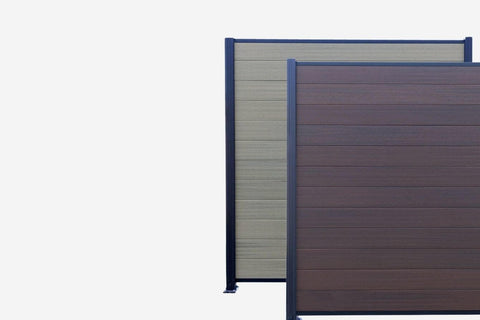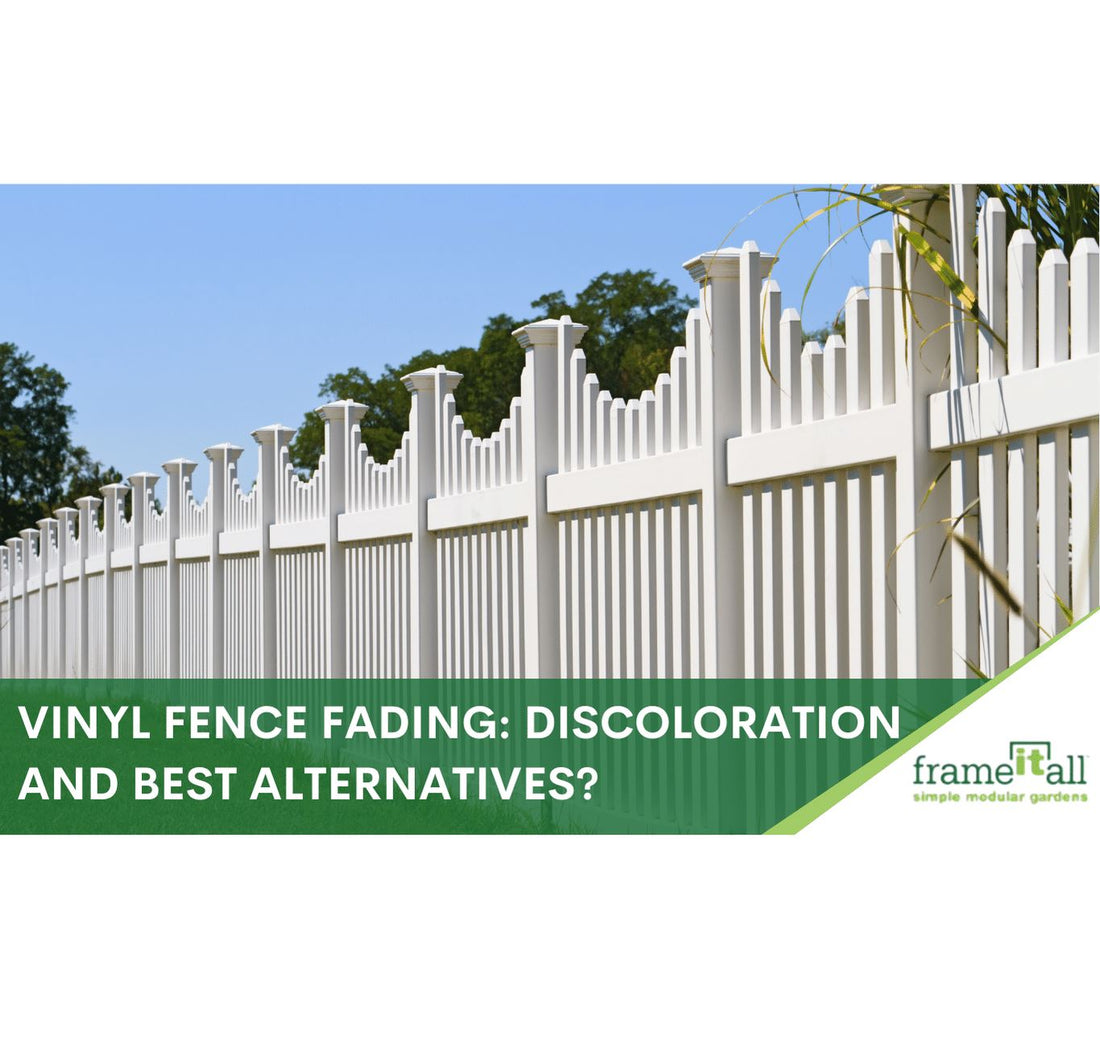Vinyl fence fading is a common concern for homeowners seeking to maintain their property's curb appeal. While some degree of change is inevitable over time, understanding the causes and preventative measures can significantly extend your fence's appearance. For those contemplating alternatives, there are several other fencing options that offer unique benefits and aesthetics. This guide will help you navigate the choices, ensuring your fence stands the test of time and continues to enhance the beauty of your home, we hope you enjoy.
First Off, Why Do Homeowners Choose Vinyl Over Its Alternatives?
Vinyl is a type of plastic, specifically polyvinyl chloride (PVC), that offers multiple benefits over its alternatives like wood and metal fencing. Homeowners typically opt for a traditional wood fence because of one of the following reasons:
-
Low Maintenance: Vinyl fences require minimal upkeep. They do not need to be painted or stained and can be cleaned easily with soap and water. This makes them a convenient option for homeowners who do not want to spend a lot of time and money on fence maintenance.
-
Durability: Vinyl is a non-porous material that resists pests (like termites), rot, and decay. It doesn't absorb moisture, which means it won't blister, peel, or corrode. This longevity makes it a cost-effective choice over time.
-
Aesthetic Appeal: Vinyl products come in a variety of styles, colors, and finishes, which can mimic the look of traditional wood fencing or present a sleek, modern appearance. This versatility can contribute to the aesthetic appeal of a property and can also be a factor in increasing home value.
Should You Actually Be Concerned About Your Vinyl Fence Fading Or Is It A Myth?

Some fading is natural over time, especially with the constant sun exposure you'll get, particularly if you're based in Florida, Texas or South California. Most modern vinyl fences come with UV inhibitors to combat this.
Common Concerns Around Ultraviolet Inhibitors
While UV inhibitors are beneficial for prolonging the life and appearance of vinyl products, there are a few considerations to keep in mind:
-
Cost: Fences with higher concentrations of UV inhibitors can be more expensive. The initial investment is higher compared to vinyl fencing without these additives.
-
Environmental Concerns: Some UV inhibitors may contain chemicals that are not environmentally friendly. It's important for consumers to consider the ecological impact of these additives and look for fences made with inhibitors that have a lower environmental impact.
-
Effectiveness Over Time: While UV inhibitors significantly slow down the fading process, they may not stop it entirely. Over many years, even with UV protection, some degree of fading can occur, especially in areas with intense sunlight.
-
Possible Chemical Degradation: In rare cases, certain chemical components of UV inhibitors might degrade over time, which can reduce their effectiveness and potentially affect the vinyl's quality.
-
Health and Safety: Although it’s not a common issue, there's always a concern about the potential health and safety effects of any chemical additives used in consumer products.
It’s essential to choose vinyl fencing from reputable manufacturers that use safe, effective, and environmentally responsible UV inhibitors to minimize any potential downsides.
Your Best Alternatives to Vinyl Fencing
Composite Fencing - Your Best Eco-Friendly Option

Vinyl fencing is incredibly popular - and for good reason. But we are starting to see more and more privacy fences going up that are made of composite materials. Composite is extremely durable, resistant to corrosion and has the eco-friendly benefits on the environment of using recycled plastics. Like vinyl, it requires very little upkeep to keep it looking great and will give your yard more of a premium feel. You also have a few different looks you can pick from including horizontal fencing or individual pickets.
Our innovations in the composite fencing space are something we're incredibly proud of here at Frame It All. If you're interested in getting a sample of composite fencing to see if it's right for you, check out our 360 Cap Composite Fencing today.
Learn more here: Why Homeowners Are Choosing Composite Over Vinyl Fencing

Other Alternatives
There are dozens - if not - hundreds of other fence materials for you to choose from, from wrought iron to rammed Earth. If you are looking for a vinyl fence (or a replacement), it's likely you're considering the different types of 6-foot privacy fences available. The most common options are wood and composite, but don't discount the live options out there hedges, bamboo and reed. These can really add a natural look to your home, whilst giving the privacy you're looking for.
If you want to make an eco-friendly choice: Read Our Best Eco-Friendly Fence Picks
Final Thoughts
Vinyl fences, when treated correctly, will be able to maintain their color well. While vinyl fences are an excellent, low-maintenance option for many homeowners, they're not the only option. Newer innovations are coming in every year and composite fencing is something you might not have considered yet!
Composite fences are made from wood fibers and recycled plastics. They take the benefits of vinyl and put it into a premium, eco-friendly alternative. Composite fencing is resistant to rot, able to withstand harsh weather, and does not require any painting or staining.
Interested? Contact us to get yourself a sample of 360 Cap Composite Fencing today!
FAQs About Vinyl Fences Fading
Does The Sun Cause Vinyl Fence Fade?
Most of the time, discoloration in white vinyl fences is caused by prolonged exposure to the sun's harmful ultraviolet (UV) rays. This fading over time due to long exposure to sunlight is common in many fence materials.
Can Fade Be Prevented?
Vinyl needs to be treated in order to prevent fade. Manufacturers use chemicals like titanium dioxide (TiO2) to make this happen. This feature, known as fade protection, helps vinyl maintain its original color for longer.
What Makes Vinyl Fences Turn Yellow?
A quality vinyl fence won't turn yellow over time due to sun exposure. Yellowing is often a sign of inferior products, so - whether you're choosing vinyl or an alternative - don't always go for the cheapest option and work with a reputable fence supplier to ensure quality.
How Much Upkeep Do Vinyl Fences Need?
Vinyl fences require low maintenance. Unlike wood fences that need regular paint jobs, vinyl fences merely need occasional washing with a garden hose to remove dirt and debris, keeping them looking fresh and clean.
Do Vinyl Fences Fade More Than Wood Fences?
Not necessarily. A high-quality vinyl fence with proper UV protection should not fade more than a wood fence. Both materials change over time due to sun exposure, but a well-made vinyl fence should resist fading better than wood.
Is Vinyl The Best Option For Fencing?
Choosing vinyl as your fencing option offers several long-term benefits. Besides its low-maintenance and high durability against harsh weather, vinyl fences come in a variety of colors and styles, making it a customizable choice for homeowners.
However, the best choice for you is very dependent on what you like and what you need. Check out our article on the Best Fence Material For You to gather more of an idea!
Can Vinyl Fences Be Repainted To Prevent Fading?
Unfortunately, painting a vinyl fence is usually not a good idea since the paint tends not to adhere well to the vinyl surface. Instead, focus on maintaining the surface clean.
How To Keep Your Vinyl Fence Looking Great?
Stay on top of the upkeep. Though it requires little maintenance compared to wood, cleaning it with a hose will help prolong its life and keep it looking good.

